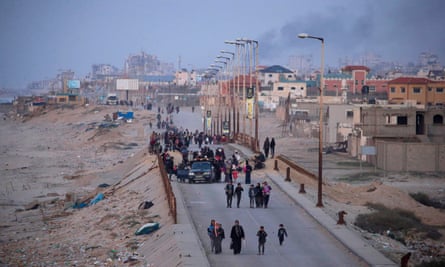Israel’s prime minister has told the Biden White House that he rejects any moves to establish a Palestinian state when Israel ends its offensive against Gaza, and that all territory west of the Jordan River would be under Israeli security control.
Benjamin Netanyahu has sought to obstruct the establishment of a Palestinian state throughout his political career, despite occasional lukewarm endorsements of the idea.
His public statement on Thursday, however, represented his sharpest rebuttal of US foreign policy at a time when the Biden administration has expended huge domestic political capital to support Israel militarily and in international forums.
The White House responded by saying the US would continue working towards a two-state solution and that there could be no Israeli reoccupation of Gaza when the war concluded.
“There will be a post-conflict Gaza, no reoccupation of Gaza,” the White House national security adviser, John Kirby, told reporters onboard Air Force One after Netanyahu’s speech.
In a further development, shortly after Netanyahu’s address, Mexico and Chile announced they had referred Israeli actions in the occupied Palestinian territories to the prosecutor of the international criminal court for the investigation of possible “war crimes”.
The Mexican foreign ministry said it had taken the step over growing concern about the latest escalation of violence and civilian casualties.
In a nationally broadcast news conference, Netanyahu vowed to press ahead with the offensive until Israel realised a “decisive victory over Hamas”. He said he had relayed his rejection of a Palestinian state to the US.
“In any future arrangement … Israel needs security control of all territory west of the Jordan [River],” Netanyahu told a nationally broadcast news conference. “This collides with the idea of sovereignty. What can you do?”
Netanyahu, whose political support has collapsed since Hamas’s 7 October surprise attack on southern Israel that killed about 1,200 Israelis and other nationals, appeared to explicitly tie his own political survival to that of Israel.
“The day after Netanyahu,” he said. “It’s the day after most of Israel’s citizens. For 30 years, I have been consistent, saying one simple thing: this conflict is not about a lack of a state, but about the existence of a state.
“Every territory we pull out from, we get terror, terrible terror against us. It happened in southern Lebanon, it happened in the Gaza Strip, and it happened in [the West Bank] when we did it, in parts.”
He added: “The prime minister needs to be capable of saying no to our friends.”
In a statement issued later to coincide with a meeting of his war cabinet, Netanyahu warned the war would take months and promised “total victory over Hamas”.
“Victory will yet take many long months, but we are determined to achieve it….
“Israel under my leadership will not compromise on less than total victory over Hamas, and we will win. I say this again, so that no one will be in doubt: We are striving for total victory, not just ‘to strike Hamas’ or ‘to hurt Hamas’, not ‘another round with Hamas’ but total victory over Hamas.”
The US had been urging Israel to scale back its offensive in Gaza and had been pushing for an end to the phase of major fighting. It said the establishment of a Palestinian state should be part of the “day after”.
There has been increasingly visible frustration among senior Biden officials with the Israeli prime minister.

Netanyahu’s intervention also comes amid growing tensions in his own governing coalition not least around his refusal to discuss concrete proposals for the “day after” in Gaza.
Netanyahu’s explicit rejection of a Palestinian state is also likely to complicate support for Israel among other countries, not least in Europe, who have long backed the two-state solution envisaged in the Oslo agreements.
It will also undermine Israel’s attempts to normalise relations with countries in the Middle East that have long backed Palestinian statehood.
More than 100 days after Hamas triggered the war with its attack, Israel continues to wage one of the deadliest and most destructive military campaigns in recent history, with the stated goal of dismantling the militant group that has ruled Gaza since 2007 and returning scores of captives. The war has stoked tensions across the region, threatening to ignite other conflicts.
More than 24,600 Palestinians have been killed, 85% of the narrow coastal territory’s 2.3 million people have fled their homes, and the United Nations says a quarter of the population are starving.
Hundreds of thousands have heeded Israeli evacuation orders and packed into southern Gaza, where shelters run by the UN are overflowing and huge tent camps have gone up. Israel has continued to strike what it says are militant targets in all parts of Gaza, often killing women and children.